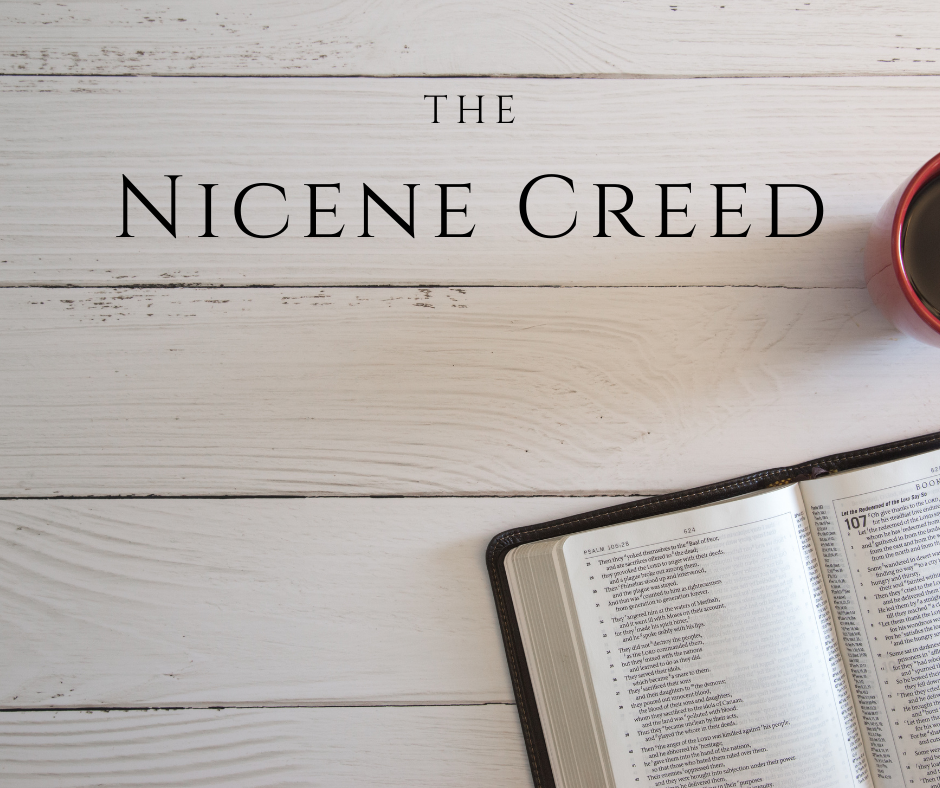How to get clean
Mark 1:40-2:17 Mark's gospel moves at a rapid pace, in which we see how various people respond to Jesus. Last week we saw the chaos ensue and crowds surround him, even after finding a quiet place to pray. Today's passage is back to the chaos and crowds. We will see how three men on the outside of society came to Jesus and their different reactions. We also see the seed of tension, which continues to grow throughout the gospel. I. Leaper (1:40-45) The
Begotten, not made
We have been looking at the eternal generation of the Son. This important doctrine is misunderstood or forgotten. One of my favorite stories is the discussion between Arius, a heretic whose teaching sparked the need for the Nicene Creed. Arius was talking to ‘Saint Nicholas’ (yes, he was a real person), and Nicholas finally slapped Arius across the face. This might seem like a strong reaction. However, the topic we are talking about has significant theological implications. Is the Son
Desolate Place
Mark 1:35-39 When you have small children, there are not many moments of rest. They wake up; you are then up. From that moment, your day is filled with needs, questions, discipline, encouragement, and a wide array of tasks. Even when they might be resting, you still have to prepare for the next stint in the race, clean their clothes, etc. There is always a need before you. The child is dependent upon the parent. They might be left for a
God from God
The next line in the creed is “God from God, Light from Light, true God from true God.” This line addresses one of the teachings of Arius. Arius taught that God the Father was eternal, and Jesus was the firstborn of creation (created). Jesus was like God, but not God. The major term he used was ‘homoiousios,’ which means a similar substance. However, the term ‘homoousios’ means the same substance. We will talk about this more when we get to
Reversing the Wilderness
Within this section Mark is showing the beginning of Jesus earthly ministry as it is set within the region of Galilee (Mark 1:14-39). This passage Jesus goes into Capernaum, which is located on the north west side of the sea of Galilee, located in small territory of in the territory of Zebulun and Naphtali (Matt 4:13). Luke explains that Jesus was rejected at Nazareth and then moved to Capernaum (Luke 4:16-31). Matthew explains that Capernaum becomes his hometown (Matt 4:13,
Begotten from the Father before all ages
Last week we looked at heresies and errors in how Jesus is the Son of God. Most of these heresies or errors came from not understanding the doctrine of eternal generation. The doctrine of the Trinity is hard for us (fallen and finite creatures) to grasp. When speaking of the uniqueness of the Son as the second person of the Trinity, not the Father and not the Spirit, we talk about his eternal generation, that is, the Father begetting the
The Preacher
Mark continues to move at a fast pace. The first impression that Mark presents of Christ after the temptation in the wilderness is that of Christ as the preacher. The Next section is really one big section from Mark 1:14-39, beginning with Christ preaching and Galilee and ending with him preaching in Galilee. Marks Gospel is really one of geography, beginning in Galilee and ending in Jerusalem with the hinge in Mark 8:29, Peter’s confession. Mark arranges the gospel not
The only Son of God
Today we come to a new line of the Nicene Creed. We are still discussing Jesus Christ (it is about 58% of the creed). The line is "The only Son of God." This week we look at an issue that has come up frequently in history. Three significant heresies that have been taught regarding the sonship of Jesus are 1) Adoptionism, 2) Islamic understanding of the Son, and 3) Eternal subordination of the Son. Due to the length of this,
Baptism and Wilderness
Mark 1:9-13 Mark's gospel is noticeably shorter than the other Gospels. It is 22% shorter than John, 38% shorter than Matthew, and 42% shorter than Luke. This is notable in the fast pace Mark jumps into the gospel, beginning with Jesus' ministry. Jesus is baptized in verse 9 of Mark. However, Matthew is still in genealogy and only at Hezekiah. Luke is only beginning to tell of the announcement of the pregnancy of John the Baptist. And John is talking about
One Lord Jesus CHRIST
This week we will finish looking at the Nicene Creed line, which says, “And in one Lord Jesus Christ.” We have seen the exclusiveness that there is only one way of Salvation. We have seen the title Lord given to Jesus and the prophetic name of Jesus as the savior of our sins. This week we look at the name Christ. Christ is not Jesus’s last name but speaks again of who Jesus is. Like the name Jesus, it is





